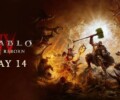God of War: Ragnarok Raises Questions on Game Trilogies
God of War developer Sony Santa Monica has recently confirmed reports that the upcoming Ragnarok entry will close out the Norse story arc. Rather than taking the trilogy approach, as the first three games managed with the Greek pantheon, this makes the new games part of a duology. With video games typically taking a three-title
The Trilogy Standard
While not exactly a universal rule, game stories being delivered in trilogy form is common. This approach made a lot of sense for years, owing to a level of consistency when it came to console release cycles. Originally, it was common for the first game in a series to release towards the start of a new system, or even as a launch title to pull users in. This would be followed by a sequel that would better leverage system understanding mid-way through the generation and a threequel which demonstrated a system’s mastery towards a generation’s end.
Prince of Persia, Mass Effect, Super Mario Bros, Jak and Daxter, Resident Evil, all these trilogies, and many more followed this approach, but it couldn’t last forever. As consoles got more complicated over time, games would become more difficult and costly to make, so the older trilogy on a single console approach would begin to waver. As with Max Payne, Metroid Prime, Halo, and Dark Souls, the third title started slipping onto later consoles, as a simple reflection of expanded development.
Finding a Solution
With costs and game complexity continuously rising, interactive entertainment industries have taken different approaches to managing this issue. Some, like the online casino game market, simply chose to keep their games simple. No overarching narratives or duology/trilogy collections, just easy-to-play titles.
Most popular casino games are translated efficiently from brick-and-mortar establishments to the online landscape, bolstered by specials like free bingo bonus features and competitive perks like no deposit schemes and club vouchers. Through their inclusion of a wide selection of slot, table, and live games, these services have managed to maintain their pace without slowing game production. Sure, the games on these websites are still growing more impressive, with ventures into new technologies like virtual reality, but unlike in video games, it’s not on an unsustainable level.
Polygon God of War review: " God of War is, in a single word, holistic. Every aspect is excellent on its own, but more importantly, it all serves and accentuates the larger vision." https://t.co/atKifa4inz via @Polygon
— Shuhei Yoshida (@yosp) April 12, 2018
Turning to duologies like God of War is doing illustrates the most recent attempt to address the issue of bloat, but it’s far from the first attempt. Much more famous was the prior fascination that developers had with episodic content, most famously demonstrated by the Half-Life 2 follow-ups. Though Valve started strong here with Half-Life 2, Episodes 1 and 2, they eventually ran out of steam (no pun intended), leaving players on a cliffhanger for 14 years and counting.
Balance in a Changing Environment
Though the duology approach for God of War isn’t necessarily good or bad, it does raise some questions about what such long delays and limited entries could mean for gaming franchises in the future. What’s more profitable, larger games released in smaller numbers, or smaller games with more common releases? What could the delay between titles mean in terms of player retention? How does the generational gap and thus the extra cost of a new console factor in?
Simply put, we don’t yet, but you can bet both developers and players will be considering these questions closely.





No Comments